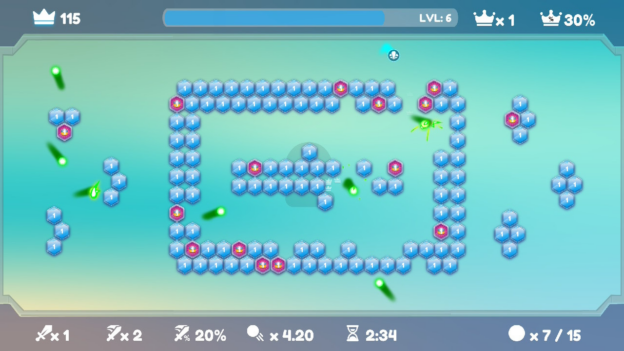King of Meat Preview – Preview

It’s difficult enough to properly gauge a brand-new title that’s still in the oven. To comment on a game that is lacking a critical developer–namely, you–is tougher still.
King of Meat is an online co-op action game where you perform as a contender in dungeons for fame and glory in a corporate-run game show set in a comical fantasy world. The twist is that each dungeon has been built with tools that are just as much accessible to the player as they are to the developer. This means you could play through community-made dungeons or try your hand at building your own.
We were invited by publisher Amazon Games to a special preview event where we were given the chance to play through multiple dungeons and explore the hub. However, it should be noted that we did not have access to the dungeon building create mode during our time.
We also had the privilege to interview a couple of the leads from developer Glowmade. I sat down with Co-Founder Mike Green and Project Lead Jim Unwin. Notably, Mike Green is a former Lionhead Studios developer where he worked on the Black & White games as well as the Fable franchise. And Jim Unwin was previously at Media Molecule where he was credited as a UI designer for the first two LittleBigPlanet games.
Glowmade’s last project was their debut title Wonderworlds, a puzzle platformer with level creation tools built for Mobile. It’s apparent that the talent at Glowmade specializes in empowering players with tools to build and manipulate game worlds. But more on the create mode later. Before we get to the meat, we have to start with the bones.
Combat is Familiar but Intuitive
Each bout consists of barreling your way to the end of a short dungeon, dispatching skeletons, solving puzzles, and cooperating with your teammates, all the while trying to increase your score multiplier, contextualized in-game as the show’s adoring fans.
King of Meat leans on conventions to make up the foundation of the combat. Only a couple of dungeons in and I already had my bearings. You’ve got your light, heavy, and ranged attacks, dodging, blocking, and jumping. The gang’s all here.

It’s familiar and not especially deep but this simplicity facilitates and compliments the approachable casual fun King of Meat is going for. I imagine this is the kind of game that newcomers will not be intimidated by, and returning players will feel comfortable picking back up months later.
Hub and Customization
Similarly familiar is the hub and customization. If you have any experience with the way modern multiplayer games handle progression you’ll feel right at home here.
One shopkeeper sells skins for your character and weapons, another sells special glory moves, and yet another sells perks that you can equip. After each dungeon, a bar fills unlocking rewards at predetermined milestones. For instance, early on I unlocked the ability to use a hammer which I could equip in place of my sword and shield for a slower, stronger playstyle. It’s a tried and true carrot-on-the-stick progression that is elevated by the colorful cast of characters that make up Ironlaw Plaza.

Early in my hands-on, I fell into the trap of skipping through the text with NPCs to get to the meat (ha) of the game, but this was a mistake. The shopkeepers, corporate spokespeople, and other denizens that inhabit Ironlaw Plaza are all uniquely zany from their expressive 2D art portraits to the vocal performances. Admittedly, when I first heard the pitch I was concerned that King of Meat’s brand of satire would become grating but I found that the writing I encountered was witty and the characters endearing.
Variety in Dungeon Design
Combat, platforming, and puzzle-solving make up the majority of the dungeon gameplay, and the Glowmade-designed levels highlighted these in different ways. One standout heavily featured rotating cogs. In one room our squad had to destroy wooden boards obstructing the cogwheels from turning to proceed. Later on, we had to use buttons to start and stop the turning gears to get them in optimal positions for platforming.
Another dungeon had us running up ramps while avoiding tumbling barrels of explosives. This happened a couple of times before culminating in a room where the tables turned and we were the ones tossing barrels at the enemies below.

After a few dungeons, I could see how the different elements were mixed within individual stages and the experience as a whole. One starts to imagine the possibilities available for user-built dungeons and the whole concept clicks. The players may be contenders in this gameshow but the real stars are the dungeons.
Switch is not an Afterthought
There’s no solid word as of yet on the resolution and framerate of the Switch version. But in speaking with Glowmade I was informed that multiplatform was the goal of development from the very start. And they have gone so far as to include touch controls for the dungeon creator. This, Green said, was an extension of their experience developing Wonderworlds for smartphones.
Building an In-House Engine
King of Meat is built using Glowmade’s in-house engine. Green admits that this decision has its share of challenges but this is the way he prefers to make games. Speaking to him and Unwin, it was evident that for Glowmade investing in an off-the-shelf engine was never a consideration. In-house was always the way.
“It’s something that interests the studio.” Jim Unwin clarified “Johnny, our CEO is from a coding background. We’ve got a very kind of strong engineering culture and all the decisions that we make from our choice of engine through to the kind of games we make are a reflection of the things that excite us.”
The dedication to building an engine encapsulates Glowmade’s identity and their approach of “joyful creativity”. Like a baton pass of invention, the programmers code the engine in which the designers build the game in which the players craft the levels.
The Create Mode
It’s a shame we weren’t able to get a proper look at the dungeon creator. It was clear from my conversation with the developers and looking into their track record that equipping their players with creative tools and eagerly awaiting the dungeons they will create fuels their passion.
“I’m just super proud of the team that have built these tools (…) it’s just constantly a surprise.” said Mike Green “And that’s what excites me the most is seeing what the community is going to build with those tools.”
“I know from experience with Wonderworlds, people were making things like—how have you done that? You’ve used this thing in a way we didn’t expect (…) And that’s super exciting.”

We do know some basics. Dungeon building was designed with controllers top of mind. Levels can be created from scratch or they can be built off pre-made templates and players will have to beat their own levels before publishing. Once published the dungeons will be ranked by early adopters in an opt-in testing lab before entering general circulation. This way the wider player base can reliably hop into a match and play a level that has been properly vetted.
Post Launch Support
Ongoing support and incentives for creators are also a priority. Glowmade hopes that King of Meat will enjoy a long life as a creative outlet for themselves and their players.
“We want to support the game as long as possible. We want to listen to the community. We want to hear like—what things do you want to build?” said Green.
“We’re never a studio that’s been short of good ideas and we’ve got a list that stretches off over the horizon” Unwin added “We’ve got a load of stuff lined up post-launch as well which includes new features, new modes, which will all have a create mode component as well.”
Final Thoughts
The creative mode remains a looming question mark over the game. King of Meat’s strongest differentiator is also its greatest unknown. How will community level designers fare building co-op dungeons alone? How quickly will it be to learn and build a dungeon for a newcomer? How will the create tool simplify the inherent complexities of building in a 3D space?
These questions and more weigh on my mind. And yet, I do have faith that Glowmade has what it takes. King of Meat isn’t this team’s first rodeo, it’s simply the next evolution in the kind of creative expression they have been empowering players with for years.




